We cannot overstate the importance of proper food storage. It ensures the freshness and quality of food, prevents the growth of harmful bacteria, and reduces the risk of foodborne illnesses.
One food item that often raises questions regarding storage is bacon bits. Yum! These small pieces of cooked bacon are a popular addition to salads, pizzas, and a variety of other dishes (personally, I love to add them in my tacos), but do they need to be refrigerated?
Today we’ll talk about everything you need to know to use these small pieces of heaven safely.
Is refrigeration necessary?
Refrigeration of your bacon bits depends on different factors including their type, packaging, and whether the package has been opened. In the following sections we’ll go over all of them.
Shelf Stability and Packaging
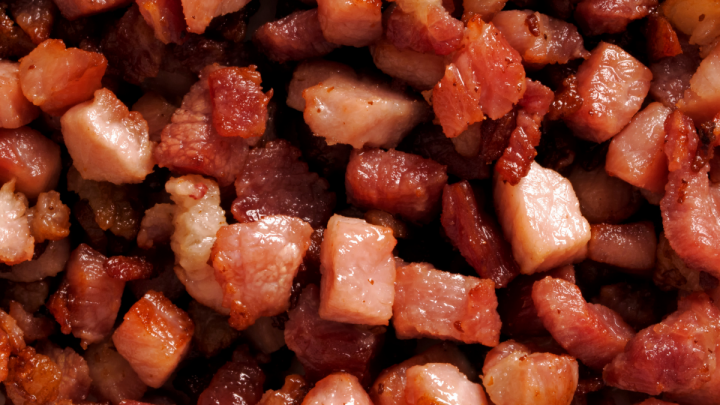
The shelf stability is largely determined by their processing and packaging. Most commercially available bacon bits are fully cooked and dried, which helps to extend their shelf life. They are also typically packaged in airtight containers or vacuum-sealed packages to prevent exposure to air and moisture, which can lead to spoilage.
Their packaging often includes a “best by” or “use by” date, which provides a guideline for the product’s optimal quality. However, it’s important to note that these dates refer to the product’s quality rather than its safety. In many cases, bacon bits can still be safe to consume after these dates, provided they have been stored properly.
The packaging may also include storage instructions, which can provide further guidance on whether the product needs to be refrigerated. It’s always a good idea to refer to these instructions to ensure you’re storing the product correctly and maintaining its quality and safety.
What affects their Shelf Life?

Several factors can influence the shelf life of bacon bits. One of the primary factors is temperature. Like many other food products, this food topping should be stored at a temperature that inhibits the growth of harmful bacteria. This is typically below 40°F (4°C) for perishable products, but may be higher for shelf-stable products.
Humidity is another important factor, as moisture can promote the growth of mold and bacteria. Therefore, bacon bits should be stored in a dry environment. Exposure to air can also affect their shelf life, as it can lead to oxidation and rancidity.
This is why it’s important to seal the product tightly after opening. Lastly, the type of bacon bits can also affect their shelf life. Real bits, which are made from cooked bacon, may have a shorter shelf life compared to imitation bits, which are typically made from soy and flavored to taste like bacon.
This is due to the higher fat content in real bacon, which can become rancid over time.
Manufacturer Guidelines
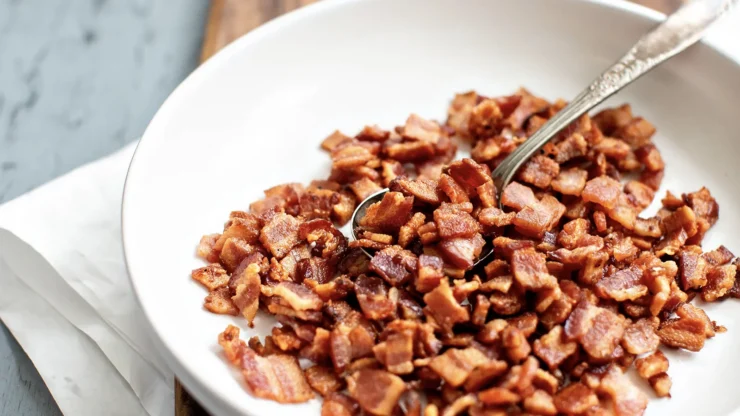
When it comes to storing, it’s always best to follow the label instructions and manufacturer guidelines. These instructions are based on the product’s specific formulation and packaging, and are designed to ensure its quality and safety.
Most commercially available bacon bits are shelf-stable and do not require refrigeration before opening. This is due to the drying and cooking processes they undergo, which reduce their moisture content and inhibit the growth of bacteria.
The packaging also plays a crucial role in maintaining the product’s shelf stability, as it protects the food topping from exposure to air and moisture. However, once the package is opened, the storage requirements may change.
Some manufacturers recommend refrigerating the product after opening to maintain its freshness and quality. It’s always a good idea to check the label for specific storage instructions once the package is opened.
Unopened Bacon Bits
Unopened food toppings, whether they are made from real bacon or are imitation, are typically shelf-stable and do not require refrigeration. This is due to the processing and packaging methods used, which are designed to extend the product’s shelf life and maintain its quality.
The drying and cooking processes that bacon bits undergo reduce their moisture content, making them less susceptible to bacterial growth. The airtight or vacuum-sealed packaging also protects the product from exposure to air and moisture, which can lead to spoilage.
Therefore, unopened bits can generally be stored at room temperature in a cool, dry place. However, it’s always a good idea to check the product’s label for specific storage instructions, as some products may have different requirements.
Opened Bacon Bits
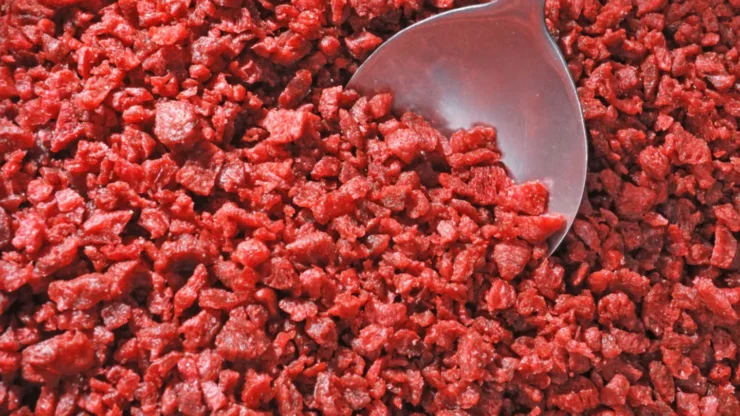
Once a package of bacon bits is opened, the storage requirements can change. Exposure to air and moisture can affect the product’s quality and safety, making it more susceptible to spoilage. Many manufacturers recommend refrigerating the food topping after opening to maintain their freshness and quality.
The cool temperature of the refrigerator can help to slow down the oxidation process and inhibit the growth of bacteria, extending the product’s shelf life. It’s important to store the product properly to ensure its quality.
This typically involves sealing the package tightly to prevent exposure to air and moisture, and storing it away from strong-smelling foods to prevent odor absorption.
Quality and Flavor Considerations
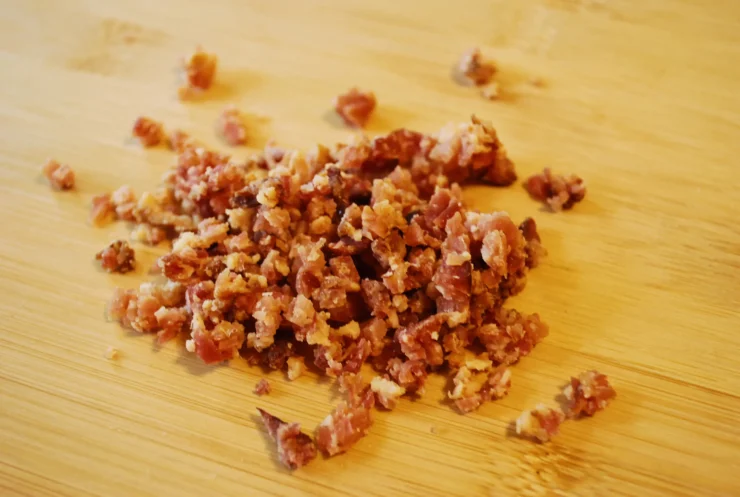
Refrigerating bacon bits can also have an impact on their quality and flavor. The cool temperature of the refrigerator can help to maintain the product’s freshness, preserving its rich, smoky flavor and crispy texture. However, it’s important to note that refrigeration can also cause the product to dry out over time, which can affect its texture.
To prevent this, it’s recommended to seal the package tightly after each use. The quality and flavor of bacon bits can also be affected by how long they are stored. Over time, the product may lose its flavor and become stale, even if it’s stored in the refrigerator.
Therefore, it’s best to use the product within a reasonable timeframe to ensure its optimal quality and flavor.
Potential Health Risks
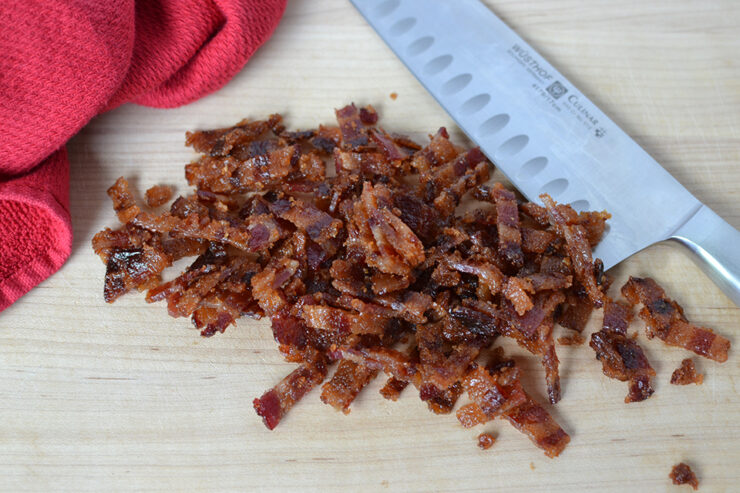
Improper storage of bacon bits can lead to potential health risks. Like any other food product, these can become contaminated with harmful bacteria if they are not stored properly. This can lead to foodborne illnesses, which can cause symptoms such as nausea, vomiting, diarrhea, and in severe cases, more serious health complications.
Bacon bits that are made from real bacon can also become rancid if they are not stored properly. Rancidity is a process that occurs when the fats in the bacon oxidize, leading to off-flavors and odors. Consuming rancid bacon bits can cause digestive discomfort and is not recommended.
Bacteria such as Salmonella, Escherichia coli (E. coli), or Listeria monocytogenes can potentially contaminate bacon bits if they are exposed to unclean surfaces, improper handling, or if they are stored at unsafe temperatures.
These bacteria can multiply rapidly in conditions where the temperature is between 40°F (4°C) and 140°F (60°C), commonly referred to as the “danger zone” for food safety. Therefore, it’s important to store them properly to ensure their safety.
This typically involves keeping the product in a cool, dry place, sealing the package tightly after each use, and refrigerating the product after opening if recommended by the manufacturer.
Alternatives to Refrigeration
While refrigeration is a common method for storing bacon bits, there are also other methods that can be used. These alternatives can be particularly useful for situations where refrigeration is not available or convenient. One alternative is to use a vacuum sealer.
Vacuum sealing removes the air from the package, which can help to extend the product’s shelf life by slowing down the oxidation process and inhibiting bacterial growth. Airtight containers can also be used to store bacon bits.
These containers can help to protect the product from exposure to air and moisture, preserving its freshness and quality. In some cases, preservatives may also be used to extend the shelf life of bacon bits. These substances can help to inhibit the growth of bacteria, yeasts, and molds, keeping the product safe to consume for a longer period.
However, it’s important to note that the use of preservatives should be done in accordance with food safety regulations and guidelines.
How to extend their shelf life?
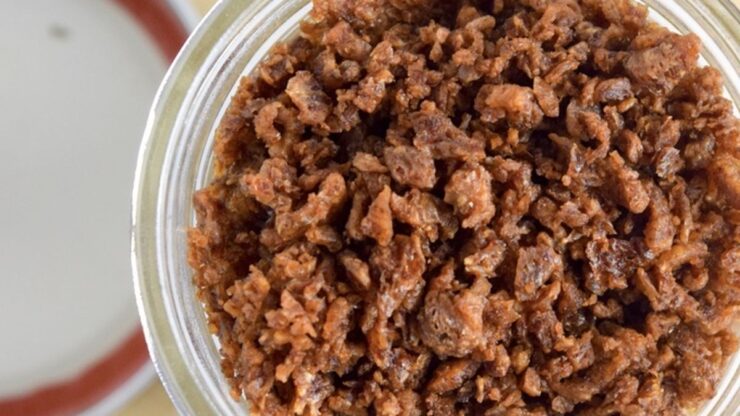
There are several ways to extend the shelf life of bacon bits. Proper handling and storage practices are crucial in maintaining the product’s quality and safety. One important practice is to always seal the package tightly after each use.
This helps to prevent exposure to air and moisture, which can lead to spoilage. Rotating your stock is also a good practice. This involves using older packages of bacon bits before newer ones, ensuring that the product is always used within its optimal quality period.
Storing the product at the right temperature is also crucial. For unopened packages, this typically involves storing the product at room temperature in a cool, dry place. For opened packages, this may involve refrigerating the product to maintain its freshness and quality.
FAQs:
Is it safe to store them in the pantry or cupboard?
They should not be stored in the pantry or cupboard as they require refrigeration to stay fresh and safe to consume.
Can I use bacon bits that have been refrigerated but are past their expiration date?
It is generally not recommended to use them that are past their expiration date, even if they have been refrigerated, to ensure food safety.
Can I freeze homemade bacon bits without any preservatives?
Absolutely , provided they are properly sealed to prevent freezer burn.
Should homemade bits be stored differently from store-bought ones?
Both should be stored similarly, following proper refrigeration guidelines.
Can they be stored in the freezer for an indefinite period?
While frozen bacon bits can have an extended shelf life, it is recommended to use them within 6 months for the best quality.
Conclusion
In conclusion, whether bacon bits need to be refrigerated depends on several factors, including the type of bacon bits, their packaging, and whether the package has been opened.
Most commercially available bits are shelf-stable and do not require refrigeration before opening, but may need to be refrigerated after opening to maintain their freshness and quality. Proper storage is crucial in maintaining their quality and safety, and can help to extend their shelf life.
This typically involves storing the product in a cool, dry place, sealing the package tightly after each use, and following the manufacturer’s storage instructions. So, the next time you reach for that package of bacon bits, remember to check the label and store the product accordingly.

